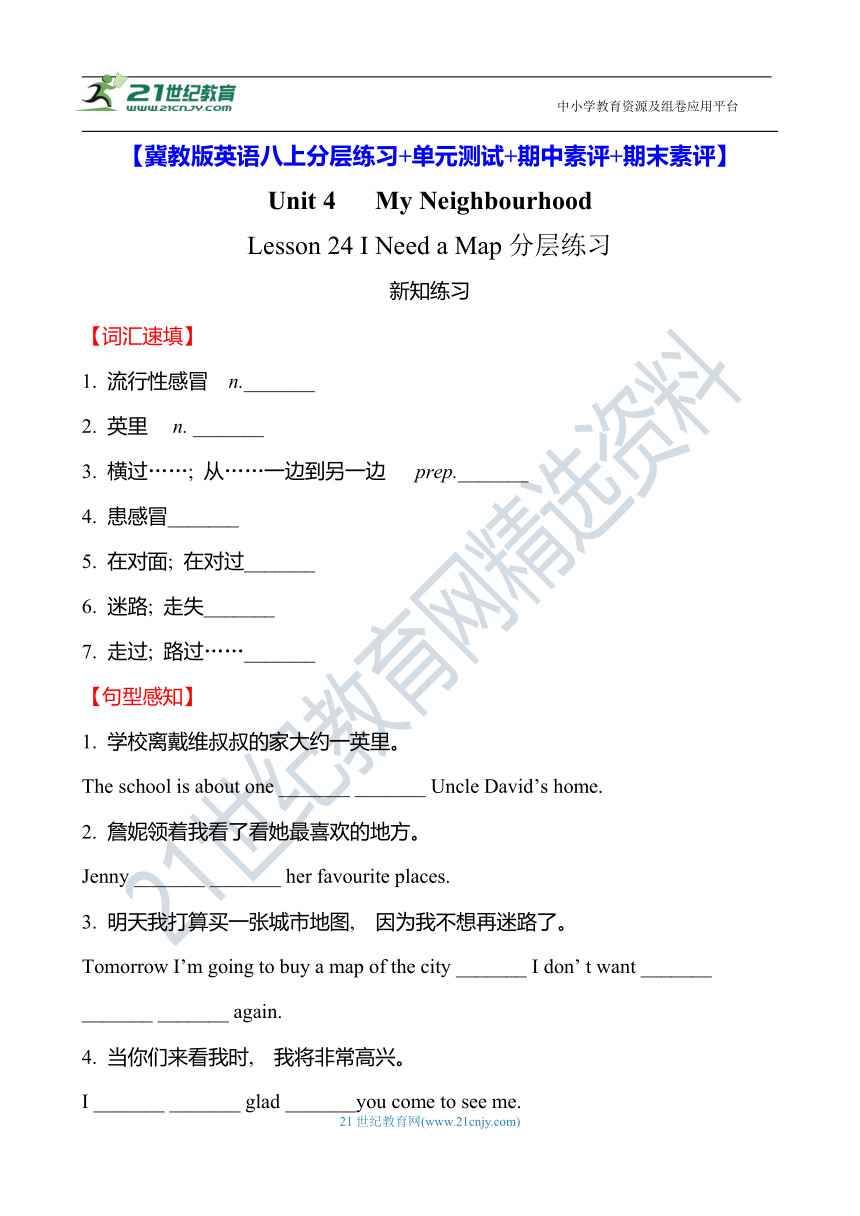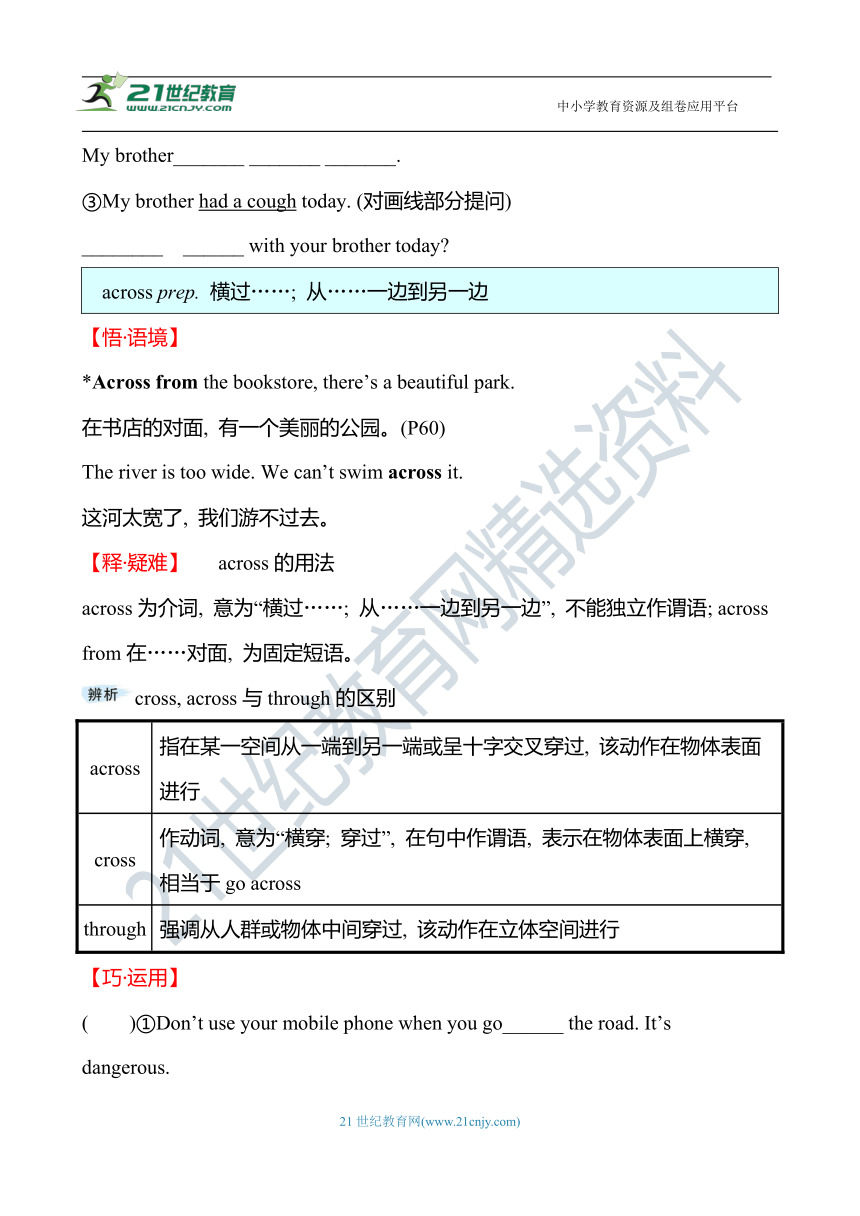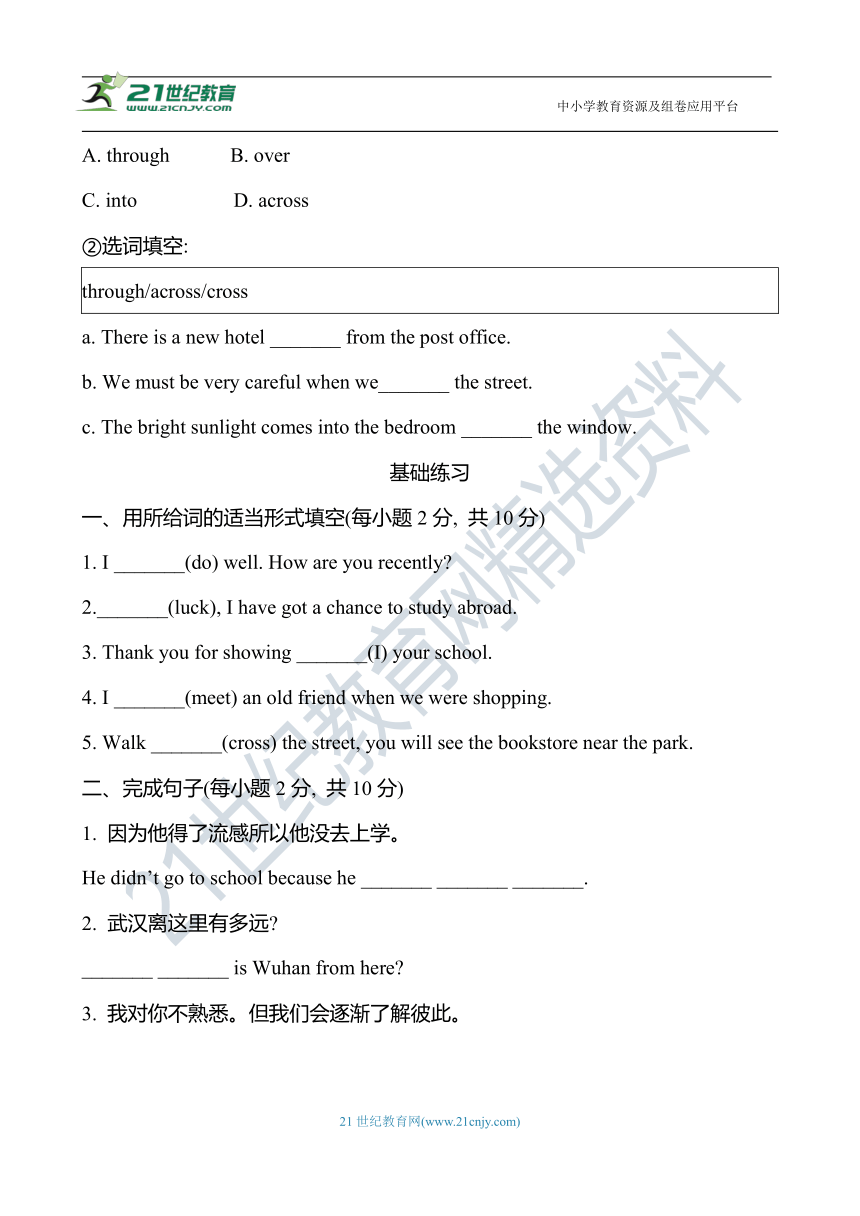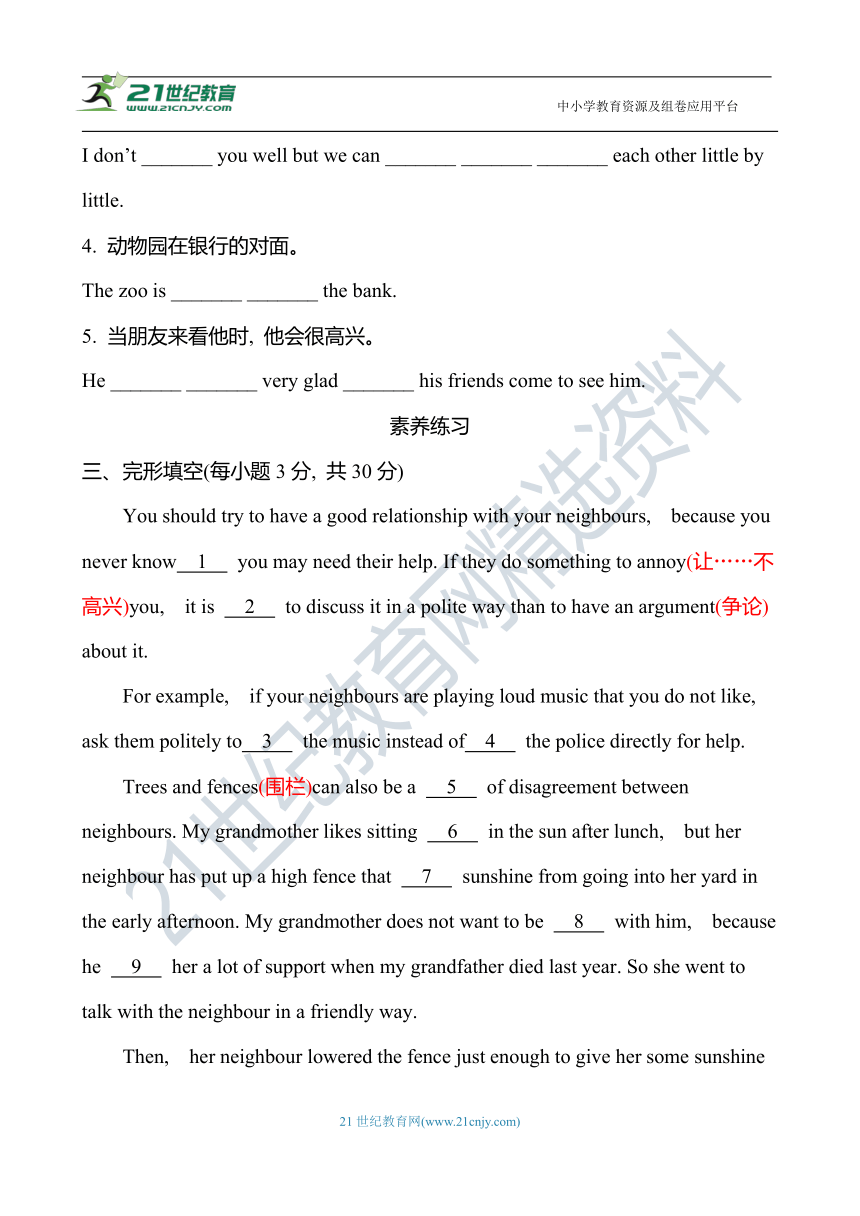(新课标)Unit 4 Lesson 24 I Need a Map分层练习(含答案)
文档属性
| 名称 | (新课标)Unit 4 Lesson 24 I Need a Map分层练习(含答案) |

|
|
| 格式 | doc | ||
| 文件大小 | 1.5MB | ||
| 资源类型 | 试卷 | ||
| 版本资源 | 冀教版 | ||
| 科目 | 英语 | ||
| 更新时间 | 2022-09-09 00:00:00 | ||
图片预览





文档简介
中小学教育资源及组卷应用平台
【冀教版英语八上分层练习+单元测试+期中素评+期末素评】
Unit 4 My Neighbourhood
Lesson 24 I Need a Map分层练习
新知练习
【词汇速填】
1. 流行性感冒 n._______
2. 英里 n. _______
3. 横过……; 从……一边到另一边 prep._______
4. 患感冒_______
5. 在对面; 在对过_______
6. 迷路; 走失_______
7. 走过; 路过……_______
【句型感知】
1. 学校离戴维叔叔的家大约一英里。
The school is about one _______ _______ Uncle David’s home.
2. 詹妮领着我看了看她最喜欢的地方。
Jenny _______ _______ her favourite places.
3. 明天我打算买一张城市地图, 因为我不想再迷路了。
Tomorrow I’m going to buy a map of the city _______ I don’ t want _______ _______ _______ again.
4. 当你们来看我时, 我将非常高兴。
I _______ _______ glad _______you come to see me.
【语篇导读】
阅读P60, 回答下列问题
1. Where is the park
_____________________________________________
2. Why is Brian going to buy a map of the city tomorrow
_____________________________________________
语言点练习
have the flu感冒(患流感)
【悟·语境】
*I have to tell you that I had the flu.
我必须告诉你们我患了流感。(P60)
*—What’s wrong with you, Jack 杰克, 你怎么了
—I have a cold. 我感冒了。
【释·疑难】
flu意为“流感”, 指流行性感冒。cold意为“伤风, 感冒”, 指着凉感冒。
have a cold意为“感冒”, 相当于catch a cold。
have a headache意为“头痛”, have a cough 意为“咳嗽”, have a fever 意为“发烧”。
【巧·运用】
①上周许多学生患了流感。
Many students _______ _______ _______ last week.
②我弟弟感冒了。
My brother_______ _______ _______.
③My brother had a cough today. (对画线部分提问)
________ ______ with your brother today
across prep. 横过……; 从……一边到另一边
【悟·语境】
*Across from the bookstore, there’s a beautiful park.
在书店的对面, 有一个美丽的公园。(P60)
The river is too wide. We can’t swim across it.
这河太宽了, 我们游不过去。
【释·疑难】 across的用法
across为介词, 意为“横过……; 从……一边到另一边”, 不能独立作谓语; across from在……对面, 为固定短语。
cross, across与through的区别
across 指在某一空间从一端到另一端或呈十字交叉穿过, 该动作在物体表面进行
cross 作动词, 意为“横穿; 穿过”, 在句中作谓语, 表示在物体表面上横穿, 相当于go across
through 强调从人群或物体中间穿过, 该动作在立体空间进行
【巧·运用】
( )①Don’t use your mobile phone when you go______ the road. It’s dangerous.
A. through B. over
C. into D. across
②选词填空:
through/across/cross
a. There is a new hotel _______ from the post office.
b. We must be very careful when we_______ the street.
c. The bright sunlight comes into the bedroom _______ the window.
基础练习
一、用所给词的适当形式填空(每小题2分, 共10分)
1. I _______(do) well. How are you recently
2._______(luck), I have got a chance to study abroad.
3. Thank you for showing _______(I) your school.
4. I _______(meet) an old friend when we were shopping.
5. Walk _______(cross) the street, you will see the bookstore near the park.
二、完成句子(每小题2分, 共10分)
1. 因为他得了流感所以他没去上学。
He didn’t go to school because he _______ _______ _______.
2. 武汉离这里有多远
_______ _______ is Wuhan from here
3. 我对你不熟悉。但我们会逐渐了解彼此。
I don’t _______ you well but we can _______ _______ _______ each other little by little.
4. 动物园在银行的对面。
The zoo is _______ _______ the bank.
5. 当朋友来看他时, 他会很高兴。
He _______ _______ very glad _______ his friends come to see him.
素养练习
三、完形填空(每小题3分, 共30分)
You should try to have a good relationship with your neighbours, because you never know 1 you may need their help. If they do something to annoy(让……不高兴)you, it is 2 to discuss it in a polite way than to have an argument(争论)
about it.
For example, if your neighbours are playing loud music that you do not like, ask them politely to 3 the music instead of 4 the police directly for help.
Trees and fences(围栏)can also be a 5 of disagreement between neighbours. My grandmother likes sitting 6 in the sun after lunch, but her neighbour has put up a high fence that 7 sunshine from going into her yard in the early afternoon. My grandmother does not want to be 8 with him, because he 9 her a lot of support when my grandfather died last year. So she went to talk with the neighbour in a friendly way.
Then, her neighbour lowered the fence just enough to give her some sunshine
10 losing his privacy(私人空间). My grandmother cut down the tree that was above his garden and dropped leaves all over his lawn(草坪)in the autumn. Finally, they reached an agreement which made both pleased.
( )1. A. after B. before C. while D. when
( )2. A. more B. best C. most D. better
( )3. A. turn down B. turn up C. turn off D. turn on
( )4. A. going B. shouting C. calling D. getting
( )5. A. corner B. cause C. result D. message
( )6. A. inside B. into C. outside D. onto
( )7. A. stops B. opens C. shows D. steals
( )8. A. lonely B. silly C. angry D. awful
( )9. A. took B. carried C. bought D. gave
( )10. A. within B. without C. along D. above
答案版
【词汇速填】
1. 流行性感冒 n. flu
2. 英里 n. mile
3. 横过……; 从……一边到另一边 prep. across
4. 患感冒 have the flu
5. 在对面; 在对过 across from
6. 迷路; 走失 be/get lost
7. 走过; 路过…… go past/by
【句型感知】
1. 学校离戴维叔叔的家大约一英里。
The school is about one mile from Uncle David’s home.
2. 詹妮领着我看了看她最喜欢的地方。
Jenny showed me her favourite places.
3. 明天我打算买一张城市地图, 因为我不想再迷路了。
Tomorrow I’m going to buy a map of the city because I don’ t want to get lost again.
4. 当你们来看我时, 我将非常高兴。
I will be glad when you come to see me.
【语篇导读】
阅读P60, 回答下列问题
1. Where is the park
It’s across from the bookstore.
2. Why is Brian going to buy a map of the city tomorrow
Because he doesn’t want to get lost again.
语言点练习
have the flu感冒(患流感)
【悟·语境】
*I have to tell you that I had the flu.
我必须告诉你们我患了流感。(P60)
*—What’s wrong with you, Jack 杰克, 你怎么了
—I have a cold. 我感冒了。
【释·疑难】
flu意为“流感”, 指流行性感冒。cold意为“伤风, 感冒”, 指着凉感冒。
have a cold意为“感冒”, 相当于catch a cold。
have a headache意为“头痛”, have a cough 意为“咳嗽”, have a fever 意为“发烧”。
【巧·运用】
①上周许多学生患了流感。
Many students had the flu last week.
②我弟弟感冒了。
My brother had/caught a cold.
③My brother had a cough today. (对画线部分提问)
What’s wrong with your brother today
across prep. 横过……; 从……一边到另一边
【悟·语境】
*Across from the bookstore, there’s a beautiful park.
在书店的对面, 有一个美丽的公园。(P60)
The river is too wide. We can’t swim across it.
这河太宽了, 我们游不过去。
【释·疑难】 across的用法
across为介词, 意为“横过……; 从……一边到另一边”, 不能独立作谓语; across from在……对面, 为固定短语。
cross, across与through的区别
across 指在某一空间从一端到另一端或呈十字交叉穿过, 该动作在物体表面进行
cross 作动词, 意为“横穿; 穿过”, 在句中作谓语, 表示在物体表面上横穿, 相当于go across
through 强调从人群或物体中间穿过, 该动作在立体空间进行
【巧·运用】
( D )①Don’t use your mobile phone when you go______ the road. It’s dangerous.
A. through B. over
C. into D. across
②选词填空:
through/across/cross
a. There is a new hotel across from the post office.
b. We must be very careful when we cross the street.
c. The bright sunlight comes into the bedroom through the window.
基础练习
一、用所给词的适当形式填空(每小题2分, 共10分)
1. I am doing(do) well. How are you recently
2. Luckily(luck), I have got a chance to study abroad.
3. Thank you for showing me(I) your school.
4. I met(meet) an old friend when we were shopping.
5. Walk across(cross) the street, you will see the bookstore near the park.
二、完成句子(每小题2分, 共10分)
1. 因为他得了流感所以他没去上学。
He didn’t go to school because he had the flu.
2. 武汉离这里有多远
How far is Wuhan from here
3. 我对你不熟悉。但我们会逐渐了解彼此。
I don’t know you well but we can get to know each other little by little.
4. 动物园在银行的对面。
The zoo is across from the bank.
5. 当朋友来看他时, 他会很高兴。
He will be very glad when his friends come to see him.
素养练习
三、完形填空(每小题3分, 共30分)
You should try to have a good relationship with your neighbours, because you never know 1 you may need their help. If they do something to annoy(让……不高兴)you, it is 2 to discuss it in a polite way than to have an argument(争论)
about it.
For example, if your neighbours are playing loud music that you do not like, ask them politely to 3 the music instead of 4 the police directly for help.
Trees and fences(围栏)can also be a 5 of disagreement between neighbours. My grandmother likes sitting 6 in the sun after lunch, but her neighbour has put up a high fence that 7 sunshine from going into her yard in the early afternoon. My grandmother does not want to be 8 with him, because he 9 her a lot of support when my grandfather died last year. So she went to talk with the neighbour in a friendly way.
Then, her neighbour lowered the fence just enough to give her some sunshine
10 losing his privacy(私人空间). My grandmother cut down the tree that was above his garden and dropped leaves all over his lawn(草坪)in the autumn. Finally, they reached an agreement which made both pleased.
( D )1. A. after B. before C. while D. when
( D )2. A. more B. best C. most D. better
( A )3. A. turn down B. turn up C. turn off D. turn on
( C )4. A. going B. shouting C. calling D. getting
( B )5. A. corner B. cause C. result D. message
( C )6. A. inside B. into C. outside D. onto
( A )7. A. stops B. opens C. shows D. steals
( C )8. A. lonely B. silly C. angry D. awful
( D )9. A. took B. carried C. bought D. gave
( B )10. A. within B. without C. along D. above
PAGE
HYPERLINK "http://21世纪教育网(www.21cnjy.com)
" 21世纪教育网(www.21cnjy.com)
【冀教版英语八上分层练习+单元测试+期中素评+期末素评】
Unit 4 My Neighbourhood
Lesson 24 I Need a Map分层练习
新知练习
【词汇速填】
1. 流行性感冒 n._______
2. 英里 n. _______
3. 横过……; 从……一边到另一边 prep._______
4. 患感冒_______
5. 在对面; 在对过_______
6. 迷路; 走失_______
7. 走过; 路过……_______
【句型感知】
1. 学校离戴维叔叔的家大约一英里。
The school is about one _______ _______ Uncle David’s home.
2. 詹妮领着我看了看她最喜欢的地方。
Jenny _______ _______ her favourite places.
3. 明天我打算买一张城市地图, 因为我不想再迷路了。
Tomorrow I’m going to buy a map of the city _______ I don’ t want _______ _______ _______ again.
4. 当你们来看我时, 我将非常高兴。
I _______ _______ glad _______you come to see me.
【语篇导读】
阅读P60, 回答下列问题
1. Where is the park
_____________________________________________
2. Why is Brian going to buy a map of the city tomorrow
_____________________________________________
语言点练习
have the flu感冒(患流感)
【悟·语境】
*I have to tell you that I had the flu.
我必须告诉你们我患了流感。(P60)
*—What’s wrong with you, Jack 杰克, 你怎么了
—I have a cold. 我感冒了。
【释·疑难】
flu意为“流感”, 指流行性感冒。cold意为“伤风, 感冒”, 指着凉感冒。
have a cold意为“感冒”, 相当于catch a cold。
have a headache意为“头痛”, have a cough 意为“咳嗽”, have a fever 意为“发烧”。
【巧·运用】
①上周许多学生患了流感。
Many students _______ _______ _______ last week.
②我弟弟感冒了。
My brother_______ _______ _______.
③My brother had a cough today. (对画线部分提问)
________ ______ with your brother today
across prep. 横过……; 从……一边到另一边
【悟·语境】
*Across from the bookstore, there’s a beautiful park.
在书店的对面, 有一个美丽的公园。(P60)
The river is too wide. We can’t swim across it.
这河太宽了, 我们游不过去。
【释·疑难】 across的用法
across为介词, 意为“横过……; 从……一边到另一边”, 不能独立作谓语; across from在……对面, 为固定短语。
cross, across与through的区别
across 指在某一空间从一端到另一端或呈十字交叉穿过, 该动作在物体表面进行
cross 作动词, 意为“横穿; 穿过”, 在句中作谓语, 表示在物体表面上横穿, 相当于go across
through 强调从人群或物体中间穿过, 该动作在立体空间进行
【巧·运用】
( )①Don’t use your mobile phone when you go______ the road. It’s dangerous.
A. through B. over
C. into D. across
②选词填空:
through/across/cross
a. There is a new hotel _______ from the post office.
b. We must be very careful when we_______ the street.
c. The bright sunlight comes into the bedroom _______ the window.
基础练习
一、用所给词的适当形式填空(每小题2分, 共10分)
1. I _______(do) well. How are you recently
2._______(luck), I have got a chance to study abroad.
3. Thank you for showing _______(I) your school.
4. I _______(meet) an old friend when we were shopping.
5. Walk _______(cross) the street, you will see the bookstore near the park.
二、完成句子(每小题2分, 共10分)
1. 因为他得了流感所以他没去上学。
He didn’t go to school because he _______ _______ _______.
2. 武汉离这里有多远
_______ _______ is Wuhan from here
3. 我对你不熟悉。但我们会逐渐了解彼此。
I don’t _______ you well but we can _______ _______ _______ each other little by little.
4. 动物园在银行的对面。
The zoo is _______ _______ the bank.
5. 当朋友来看他时, 他会很高兴。
He _______ _______ very glad _______ his friends come to see him.
素养练习
三、完形填空(每小题3分, 共30分)
You should try to have a good relationship with your neighbours, because you never know 1 you may need their help. If they do something to annoy(让……不高兴)you, it is 2 to discuss it in a polite way than to have an argument(争论)
about it.
For example, if your neighbours are playing loud music that you do not like, ask them politely to 3 the music instead of 4 the police directly for help.
Trees and fences(围栏)can also be a 5 of disagreement between neighbours. My grandmother likes sitting 6 in the sun after lunch, but her neighbour has put up a high fence that 7 sunshine from going into her yard in the early afternoon. My grandmother does not want to be 8 with him, because he 9 her a lot of support when my grandfather died last year. So she went to talk with the neighbour in a friendly way.
Then, her neighbour lowered the fence just enough to give her some sunshine
10 losing his privacy(私人空间). My grandmother cut down the tree that was above his garden and dropped leaves all over his lawn(草坪)in the autumn. Finally, they reached an agreement which made both pleased.
( )1. A. after B. before C. while D. when
( )2. A. more B. best C. most D. better
( )3. A. turn down B. turn up C. turn off D. turn on
( )4. A. going B. shouting C. calling D. getting
( )5. A. corner B. cause C. result D. message
( )6. A. inside B. into C. outside D. onto
( )7. A. stops B. opens C. shows D. steals
( )8. A. lonely B. silly C. angry D. awful
( )9. A. took B. carried C. bought D. gave
( )10. A. within B. without C. along D. above
答案版
【词汇速填】
1. 流行性感冒 n. flu
2. 英里 n. mile
3. 横过……; 从……一边到另一边 prep. across
4. 患感冒 have the flu
5. 在对面; 在对过 across from
6. 迷路; 走失 be/get lost
7. 走过; 路过…… go past/by
【句型感知】
1. 学校离戴维叔叔的家大约一英里。
The school is about one mile from Uncle David’s home.
2. 詹妮领着我看了看她最喜欢的地方。
Jenny showed me her favourite places.
3. 明天我打算买一张城市地图, 因为我不想再迷路了。
Tomorrow I’m going to buy a map of the city because I don’ t want to get lost again.
4. 当你们来看我时, 我将非常高兴。
I will be glad when you come to see me.
【语篇导读】
阅读P60, 回答下列问题
1. Where is the park
It’s across from the bookstore.
2. Why is Brian going to buy a map of the city tomorrow
Because he doesn’t want to get lost again.
语言点练习
have the flu感冒(患流感)
【悟·语境】
*I have to tell you that I had the flu.
我必须告诉你们我患了流感。(P60)
*—What’s wrong with you, Jack 杰克, 你怎么了
—I have a cold. 我感冒了。
【释·疑难】
flu意为“流感”, 指流行性感冒。cold意为“伤风, 感冒”, 指着凉感冒。
have a cold意为“感冒”, 相当于catch a cold。
have a headache意为“头痛”, have a cough 意为“咳嗽”, have a fever 意为“发烧”。
【巧·运用】
①上周许多学生患了流感。
Many students had the flu last week.
②我弟弟感冒了。
My brother had/caught a cold.
③My brother had a cough today. (对画线部分提问)
What’s wrong with your brother today
across prep. 横过……; 从……一边到另一边
【悟·语境】
*Across from the bookstore, there’s a beautiful park.
在书店的对面, 有一个美丽的公园。(P60)
The river is too wide. We can’t swim across it.
这河太宽了, 我们游不过去。
【释·疑难】 across的用法
across为介词, 意为“横过……; 从……一边到另一边”, 不能独立作谓语; across from在……对面, 为固定短语。
cross, across与through的区别
across 指在某一空间从一端到另一端或呈十字交叉穿过, 该动作在物体表面进行
cross 作动词, 意为“横穿; 穿过”, 在句中作谓语, 表示在物体表面上横穿, 相当于go across
through 强调从人群或物体中间穿过, 该动作在立体空间进行
【巧·运用】
( D )①Don’t use your mobile phone when you go______ the road. It’s dangerous.
A. through B. over
C. into D. across
②选词填空:
through/across/cross
a. There is a new hotel across from the post office.
b. We must be very careful when we cross the street.
c. The bright sunlight comes into the bedroom through the window.
基础练习
一、用所给词的适当形式填空(每小题2分, 共10分)
1. I am doing(do) well. How are you recently
2. Luckily(luck), I have got a chance to study abroad.
3. Thank you for showing me(I) your school.
4. I met(meet) an old friend when we were shopping.
5. Walk across(cross) the street, you will see the bookstore near the park.
二、完成句子(每小题2分, 共10分)
1. 因为他得了流感所以他没去上学。
He didn’t go to school because he had the flu.
2. 武汉离这里有多远
How far is Wuhan from here
3. 我对你不熟悉。但我们会逐渐了解彼此。
I don’t know you well but we can get to know each other little by little.
4. 动物园在银行的对面。
The zoo is across from the bank.
5. 当朋友来看他时, 他会很高兴。
He will be very glad when his friends come to see him.
素养练习
三、完形填空(每小题3分, 共30分)
You should try to have a good relationship with your neighbours, because you never know 1 you may need their help. If they do something to annoy(让……不高兴)you, it is 2 to discuss it in a polite way than to have an argument(争论)
about it.
For example, if your neighbours are playing loud music that you do not like, ask them politely to 3 the music instead of 4 the police directly for help.
Trees and fences(围栏)can also be a 5 of disagreement between neighbours. My grandmother likes sitting 6 in the sun after lunch, but her neighbour has put up a high fence that 7 sunshine from going into her yard in the early afternoon. My grandmother does not want to be 8 with him, because he 9 her a lot of support when my grandfather died last year. So she went to talk with the neighbour in a friendly way.
Then, her neighbour lowered the fence just enough to give her some sunshine
10 losing his privacy(私人空间). My grandmother cut down the tree that was above his garden and dropped leaves all over his lawn(草坪)in the autumn. Finally, they reached an agreement which made both pleased.
( D )1. A. after B. before C. while D. when
( D )2. A. more B. best C. most D. better
( A )3. A. turn down B. turn up C. turn off D. turn on
( C )4. A. going B. shouting C. calling D. getting
( B )5. A. corner B. cause C. result D. message
( C )6. A. inside B. into C. outside D. onto
( A )7. A. stops B. opens C. shows D. steals
( C )8. A. lonely B. silly C. angry D. awful
( D )9. A. took B. carried C. bought D. gave
( B )10. A. within B. without C. along D. above
PAGE
HYPERLINK "http://21世纪教育网(www.21cnjy.com)
" 21世纪教育网(www.21cnjy.com)
同课章节目录
- Unit 1 Me and My Class
- Lesson 1 Back to School!
- Lesson 2 Many Faces, One Picture
- Lesson 3 Getting to Know You!
- Lesson 4 Best Friends
- Lesson 5 Meet Ms. Liu
- Lesson 6 Jenny's Week
- Unit 2 My Favourite School Subject
- Lesson 7 Don't Be Late for Class!
- Lesson 8 E-mail Helpers!
- Lesson 9 I Don't Want to Miss Geography !
- Lesson 10 Looking for Lisa
- Lesson 11 Lily Learns about China !
- Lesson 12 Karen's Hair Stood Up!
- Unit Review
- Unit 3 Families Celebrate Togethe
- Lesson 13 I Love Autumn
- Lesson 14 Happy Memories
- Lesson 15 A Present for Li Ming!
- Lesson 16 Happy Thanksgiving!
- Lesson 17 Presents from Canada!
- Lesson 18 Li Ming's Birthday
- Unit Review
- Unit 4 My Neighbourhood
- Lesson 19 The Best Neighourhood
- Lesson 20 No Stopping!
- Lesson 21 Eat a Donut and Turn Right
- Lesson 22 I Like My Neighbourhood
- Lesson 23 People in My Neighbourhood
- Lesson 24 I Need a Map!
- Unit Review
- Unit 5 My Future
- Lesson 25 I Want to Be a Teacher!
- Lesson 26 What Will I Be ?
- Lesson 27 What's Your Advice?
- Lesson 28 Rich or Poor? It Doesn't Matter!
- Lesson 29 Our Ambitions and Dreams
- Lesson 30 A Famous Friend?
- Unit Review
- Unit 6 Go With Transportation !
- Lesson 31 How Do You Travel ?
- Lesson 32 Trains Go Faster !
- Lesson 33 Life on Wheels
- Lesson 34 Flying Donuts
- Lesson 35 Future Transportation
- Lesson 36 Clean Cars ?
- Unit Review
- Unit 7 Enjoy Your Hobby
- Lesson 37 What's Your Hobby ?
- Lesson 38 Hobbies Are Fun!
- Lesson 39 Danny's Hobby
- Lesson 40 What's Paul's Hobby?
- Lesson 41 Show and Tell!
- Lesson 42 The New Club
- Unit Review
- Unit 8 Celebrating Me
- Lesson 43 What Makes You Unique?
- Lesson 44 Georgia Plays Basketball
- Lesson 45 Be Yourself !
- Lesson 46 My Dream
- Lesson 47 I Made It !
- Lesson 48 Li Ming's Report
- Unit Review
